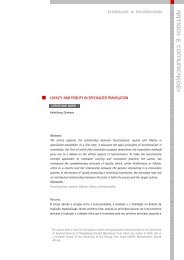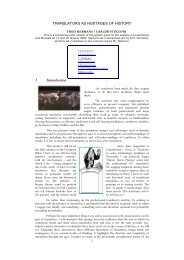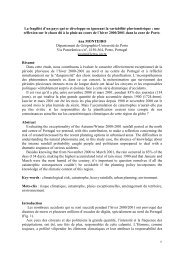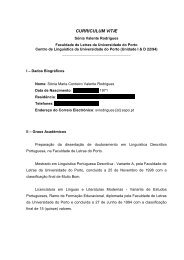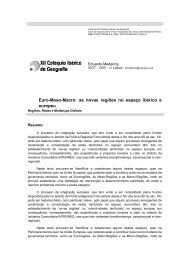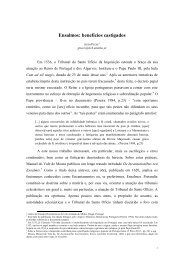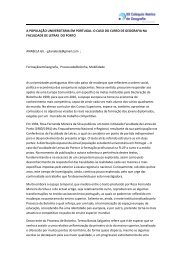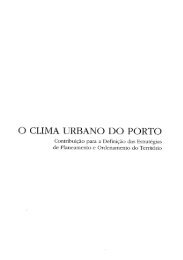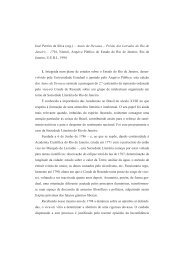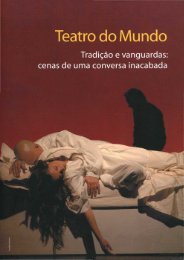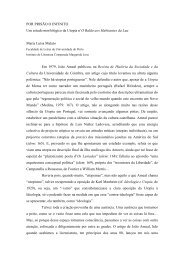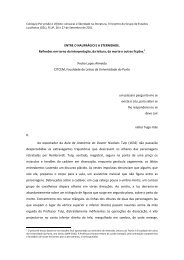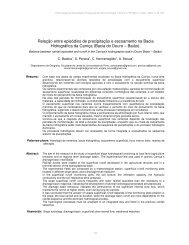Varieties of English: South African English by Vanessa Reis Esteves ...
Varieties of English: South African English by Vanessa Reis Esteves ...
Varieties of English: South African English by Vanessa Reis Esteves ...
Create successful ePaper yourself
Turn your PDF publications into a flip-book with our unique Google optimized e-Paper software.
Charles Barber suggests, “It is perhaps in vocabulary that we see the greatest divergence<br />
between the different varieties <strong>of</strong> <strong>English</strong> as a first language.” (2000: 252.) This because, life in<br />
the new colonies was indeed very divergent to what it had been in the old European continent.<br />
As such, the settlers in the new colonies rapidly felt an urgent need to adapt already existing or<br />
old words in the <strong>English</strong> language or even to create new ones, so as to express the reality in<br />
which they now found themselves in. This gave rise to the creation <strong>of</strong> a whole new lexicon<br />
capable <strong>of</strong> meeting the needs <strong>of</strong> a new society and environment. As such, <strong>South</strong> <strong>African</strong><br />
<strong>English</strong> has received many loans from the many native languages spoken in the country as this<br />
is the most common way <strong>of</strong> forming new vocabulary.<br />
Afrikaans has provided a number <strong>of</strong> significant contributions to <strong>South</strong> <strong>African</strong> <strong>English</strong>. As Elmes<br />
stresses: “About half the words in the national lexicon that are distinctively <strong>South</strong> <strong>African</strong><br />
originate in Afrikaans: words such as “klo<strong>of</strong>” (valley), “veld” (open country) and “dorp” (village).<br />
(Elmes, 2001:85) Penny Silva considers that this process <strong>of</strong> assimilation began immediately<br />
upon the settler’s arrival in the country:<br />
“They started from the very first day. People landed on the beach at Port Elizabeth and they were collected <strong>by</strong><br />
Dutch farmers in their wagons and taken up the country to the area <strong>of</strong> Grahamstown, and they picked up<br />
words. You can imagine somebody sitting in the back <strong>of</strong> a wagon and pointing at an animal or plant that they<br />
saw and the Dutch farmer giving them the name <strong>of</strong> it.”<br />
In the early diaries, in the first few months, you find the words just popping up as though they’re known<br />
already. They arrived in April 1820 and <strong>by</strong> late April, early May, the diaries are starting to reflect words like<br />
“kraal” as the word for a cattle enclosure, and like “Boer”, because <strong>of</strong> the farmers’ names for themselves. You<br />
get a lot <strong>of</strong> wagon terminology too - “trek” for the journey that you do, the “voorlooper” for the man who led the<br />
cattle. The “voorlooper” was a young boy who took the “riem” as it was called- the leather thong- and led the<br />
oxen along. And your wagon pole, to which the oxen were attached was called the “diesselboom”, and that<br />
starts coming in with all sorts <strong>of</strong> odd, strange spellings. “Thistleboon” was one Anglicised form <strong>of</strong> it. The<br />
wagon chest was the “voorkis”, and that replaces <strong>English</strong> in most <strong>of</strong> the diaries that you find- all sorts <strong>of</strong> quite<br />
technical language coming in from the whole business <strong>of</strong> using wagons and travelling.” (Elmes, 2001:85).<br />
Afrikaans words linked to the country’s climate and foods have also entered the language and<br />
are still in use to this very day. “Biltong” (a type <strong>of</strong> dried meat) is much adored <strong>by</strong> <strong>South</strong> <strong>African</strong>s<br />
as are “beskuit” (dried hard rusks). <strong>South</strong> Africa’s warm climate <strong>of</strong>ten invites its inhabitants to<br />
make a “braai” (barbecue) where they “braai” “braaivleis” (the meat cooked on the barbecue)<br />
and “mealies” (an ear <strong>of</strong> maize) accompanied <strong>by</strong> “pap” (a porridge made from “mealie”).<br />
“Boerewors” (a spicy farmer type sausage usually made from beef) or “sosaties” (kebabs on a<br />
stick) are also a national favourite. <strong>South</strong> <strong>African</strong> “naartjies” (an orange coloured citrus fruit<br />
similar to tangerines) have quite a reputation. “Potjiekos” (a rich stew cooked in a three-legged<br />
cast-iron pot over a fire) is one <strong>of</strong> the country’s traditional dishes. However, the Afrikaans<br />
influence is much vaster than the above mentioned topics. Many children run around in “tekkies”<br />
(trainers) and many people drive a “bakkie” (a pickup truck). If you get into a fight, you can<br />
always “bliksem” (beat up or punch) your aggressor. The list is endless.<br />
<strong>South</strong> <strong>African</strong> <strong>English</strong> has adopted numerous influences from many <strong>of</strong> the local indigenous<br />
<strong>African</strong> languages such as “the Khoi which contributed the click sounds to the Xhosa language,<br />
and to <strong>English</strong> such words as “gnu”” or “eina”.<br />
If the Cape Dutch speakers contributed the largest number <strong>of</strong> items to the <strong>South</strong> <strong>African</strong> lexicon, at 10 per<br />
cent the influence <strong>of</strong> indigenous <strong>African</strong> languages is also considerable. The most important is that <strong>of</strong> the<br />
Khoi, a collective term for a large number <strong>of</strong> gentle, pastoral small tribes <strong>of</strong> indigenous <strong>African</strong> people (who<br />
were not Bantu), found all along the Cape coast from Cape Town into the interior. They were previously<br />
known <strong>by</strong> the term- now deemed unacceptable- Hottentot.” (Elms, 2001: 86)<br />
Penny Silva explains that: “A very central word in <strong>South</strong> <strong>African</strong> <strong>English</strong> from the Khoi language<br />
is the local word for “ouch”, which in <strong>South</strong> <strong>African</strong> <strong>English</strong> is “eina”. I don’t think any <strong>South</strong><br />
<strong>African</strong> children would say “ouch!”, they all say “eina!”…” (Elmes, 2001:87). The word “khaya”<br />
(home) has been loaned from the Nguni group <strong>of</strong> languages. “Mampara” (meaning an idiot or<br />
silly person) has been adopted from the Sotho languages.



